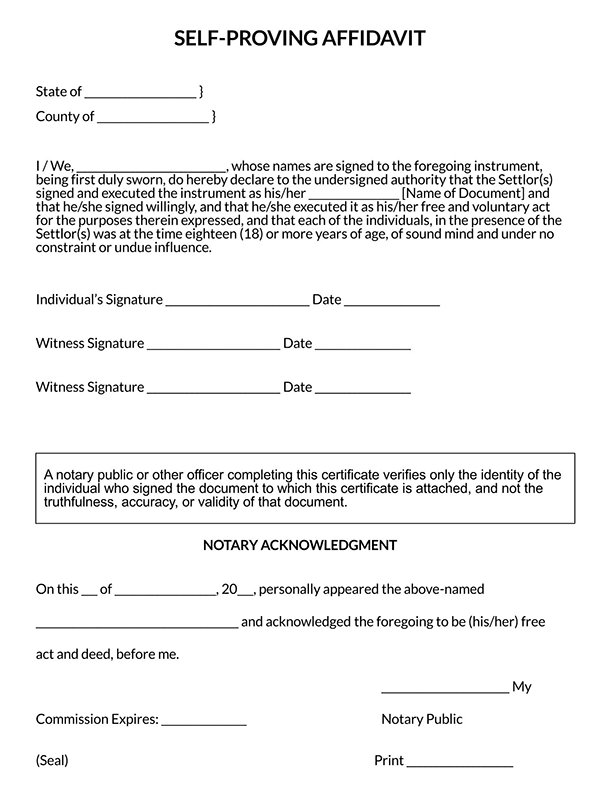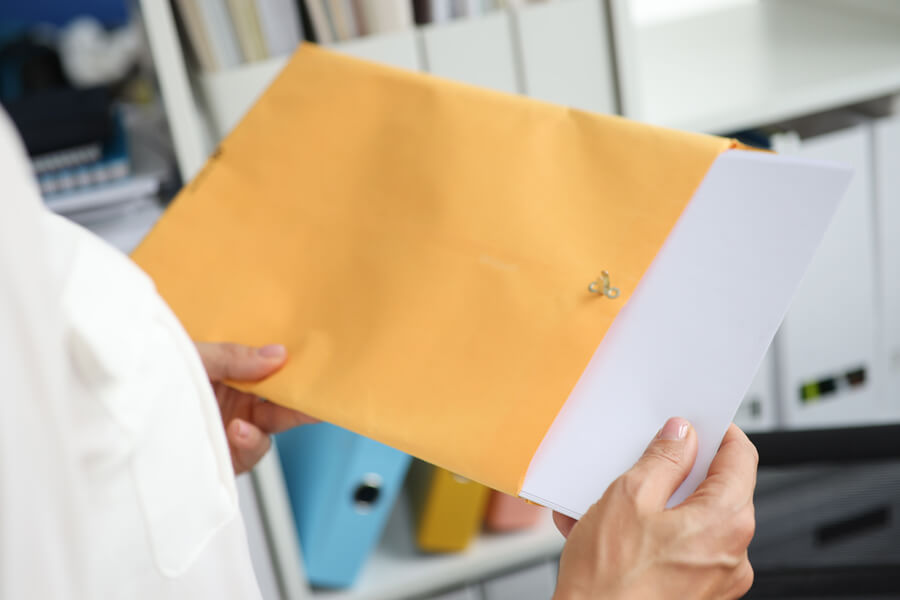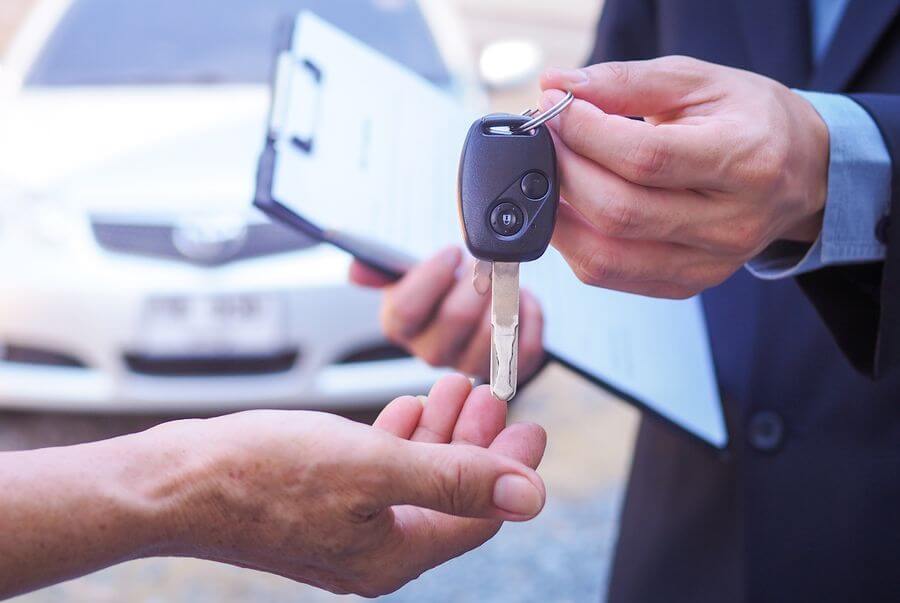A self-proving affidavit is an official notarized statement used to prove or verify that a testator created a will of their own accord without any influence or being coerced.
A testator is an individual who has created a will or a legacy. After creating the will, a testator must prepare the self-proving affidavit and attach it as part of the document.
It should be crafted to present the information in a language that acknowledges, usually under oath, that the witnesses were present when the testator was singing the will. A will is an important document, and once created, a testator must prepare and sign the self-proving affidavit according to the state laws.
A self-proving affidavit form is a document used by a testator to verify that their will exists, is legal, and is valid.
This form acts as evidence of a properly executed will. It ensures that all the information that must be included to make the affidavit valid is present.
Since each state has its own forms based on the rules and laws of that particular state, a form makes it easier for the testator to prepare and sign the affidavit. With the form, the testator is sure that they have upheld the state laws. A testator should, therefore, ensure that they access a self-proving affidavit form from the state they are in and are planning to file one.
This self-proving affidavit is only legally binding if it contains a testator’s signature and the witnesses’ signatures during the will signing. This affidavit is one page long and must be notarized.
Free Templates
Following are some free downloadable templates for you:

Forms by state
Primary Purpose of a Self-Proving Affidavit
The primary purpose of a self-proving affidavit is to offer security to a testator’s will if the will is challenged after the testator is dead. In addition, the affidavit acts as proof that the will was signed under the state’s law. Finally, the probate process can speed up or even be skipped entirely.
While in probate court, the aim of the will executor will be to prove that the will actually belongs to the testator, and having a self-proving affidavit makes this process easier. With a will and an affidavit attached to it, the probate court will not have to track down the witnesses or delay the process if the witnesses cannot be reached.
States where Self-Proving Affidavit is Not Applicable
Whether or not a testator needs a self-proving affidavit depends on the state they are in. It is applicable in all states of the USA, except for certain states.
For the following two states, a self-proving affidavit is not required to verify the will:
- Columbia
- Ohio
note
That means a will must be proved in probate court once the testator is dead but using a self-proving affidavit is not an option for this process. Whether the self-proving has been prepared or not, the witnesses must attend court to verify the testator’s will.
The self-proving affidavit is not applicable, and the testator does not need to prepare one in the following states:
- California
- Nevada
- Illinois
- Maryland
- Indiana
note
This means that for these five states, the will is self-approved without using a self-proving affidavit or having to go through probate court. This is true if the will has both the testator’s signature and the witnesses’ signature.
How Self-Proving Affidavit Helps Prove a Will
It can help or benefit the proving the will in a few ways.
Some of these are the following:
- The affidavit, “under penalty of perjury,” indicates that the witnesses accepted the will as authentic and even signed it.
- If the will is challenged by a family member, it protects the testator’s loved one from loss of time and money (legal fees) by skipping the probate court since there is no need to prove the will’s legality.
- The affidavit also reduces stress on the part of the testator’s loved ones while they are sad and mourn the testator’s death.
- it ensures that the witnesses do not have to disrupt their lives to stand in probate court.
- The affidavit reduces the chances of the will execution being delayed due to unavailable or dead witnesses when it is time to validate the will. This means that loved ones can get their assets faster.
note
Whether the testators will be challenged or not, leaving behind a self-proving affidavit will ensure that the judge in probate court regards the will as genuine and legal, thereby preventing any chances of wrong will execution.
That means, if there are two wills with similar instructions, the judge in probate court will allow for the execution of the most recent one. In the case of two wills with different instructions, the will with the affidavit attached to it will be the one the judge chooses for execution.
When the Affidavit is Not Required to Make a Will
A testator does not need one to make a valid will.
However, for a testator to prepare a valid will, here are the requirements they need:
- A testator should be 18 years old.
- The testator should be of sound mind.
- A testator should prepare and sign the will
- A testator should sign the will in the presence of two witnesses, who should also sign the will. The witnesses chosen should not be recipients of any assets in the will.
How to Get a Self-Proving Affidavit
A self-proving affidavit is usually a brief legal document that does not require the testator to access any legal advice so that they can get it.
Here is a guide on how to get one:
Get a form
The testator should get a self-affidavit form from their lawyer or can download one from this page. This is possible if the testator’s state accepts the affidavit as evidence of a valid will. These states usually offer templates or samples for it, the language to be used according to the probate court, and the information that should be included. The testator can access a self-proving affidavit form from the state’s website.
Gather two disinterested witnesses
The different states present different signing requirements for testators. A testator should choose two witnesses who are not in the will for the signing process. Witness requirements may vary from state to state.
EXAMPLE
Some states require an 18-year-old, while others, like Texas, allow witnesses as young as 14.
Schedule to meet with a notary
Although notarization is not necessary in all states, the testator must meet with the notary in order to protect their will. The self-approving affidavit must be notarized according to the state’s law.
Therefore, a testator should create time to notarize the affidavit in front of the notary public along with the chosen witnesses. The notary public usually stamps the form after the signing process occurs with an official seal.
Sign and store with the will
It is mandatory to store the affidavit with the will. The two should be stored in a protected place where the will executor can access them. A testator should also inform their executor about the presence of an affidavit of their will.
Writing a Self-Proving Affidavit
As a testator, it is necessary to have it to validate the will.
Here is a guide on how a testator can write a self-proving affidavit:
Start with the paperwork
The paperwork entails gathering all the parties and forms needed to actualize this affidavit. Therefore, the testator should be aware that they require two witnesses, the notary public and the signature party, to execute the whole paperwork. Then, they should download the form online or access it through their attorney.
Indicate the location where it is implemented
The first part of the form will require the testator to indicate where the form is implemented. This includes the state and the county, respectively.
Provide the identity of the witnesses
The next stage requires the testator to provide the identity of the witnesses by writing his or her name in the blank spaces provided on the self-proving affidavit form.
Identify paperwork with the document
The second blank space requires the testator to mention the paperwork referred to in the document. This can either be a Living Will or a Trust. The executor will find it easier to identify the paperwork attached to the affidavit since the testator mentioned it.
Signatures of each party
There are three blank spaces for this stage of the paperwork. The first blank space requires the testator’s signature and the date when the signature was made. The other two blank spaces are for the two witnesses who will sign and then indicate the date they signed.
Verification and notarization
The final part is the notarization by the notary public. The notary public needs to provide the date of the signing, indicate the testator’s name, provide their standard commission information, and officially stamp the paperwork.
The self-proving affidavit has now been verified and notarized, which means that the testator can attach it to their will.
Signing Requirements
Every state that requires a self-proving affidavit to validate a will has specific signing requirements that the testator must observe.
Whether it is the testator’s signature or the witnesses’ signatures, here is a table that breaks down all the signing requirements that a testator must observe for different states:
| States | Laws |
| Alabama | § 43-8-132 |
| Alaska | § 13.12.504 |
| Arizona | § 14-2504 |
| Arkansas | § 28-25-106 |
| California | § 8220 |
| Colorado | § 15-11-504 |
| Connecticut | § 45a-285 |
| Delaware | § 12-13-1305 |
| Florida | § 732.503 |
| Georgia | § 53-4-24 |
| Hawaii | § 560:2-504 |
| Idaho | § 15-2-504 |
| Illinois | § 755-5-6-4 |
| Indiana | § 29-1-5-3.1 |
| Iowa | § 633.279(2) |
| Kansas | § 59-606 |
| Kentucky | § 394.225 |
| Louisiana | No statute |
| Maine | § 2-503 |
| Maryland | No statute |
| Massachusetts | § 2-504 |
| Michigan | § 700.2504 |
| Minnesota | § 524.2-504 |
| Mississippi | § 91-7-10 |
| Missouri | § 474.337 |
| Montana | § 72-2-524 |
| Nebraska | § 30-2329 |
| Nevada | § 133-050 and § 133-055 |
| New Hampshire | § 551-2-a |
| New Jersey | § 3B:3-4 |
| New Mexico | § 45-2-504 |
| New York | § 1406 |
| North Carolina | § 31-11.6 |
| North Dakota | § 30.1-08-04 |
| Ohio | No statute |
| Oklahoma | § 84-55(5) |
| Oregon | § 113.055 |
| Pennsylvania | § 3132.1 |
| Rhode Island | § 33-7-26 |
| South Carolina | § 62-2-503 |
| South Dakota | § 29A-2-504 |
| Tennessee | § 32-2-110 |
| Texas | § 251-104 |
| Utah | § 75-2-504 |
| Vermont | § 14-3-108 |
| Virginia | § 64.2-452 |
| Washington | § 11.20.020 |
| West Virginia | § 41-5-15 |
| Wisconsin | § 853-04 |
| Wyoming | § 2-6-114 |
Frequently Asked Questions
It is not available in the following five states: California, Nevada, Illinois, Maryland, and Indiana.
To make a will valid, the testator must be 18 years old, of sound mind, and prepare and sign the will. Also, they need witnesses who are not in the will to witness their signing and sign the will.
A will does not need to be notarized, especially if the testator has signed it with two witnesses. However, notarizing a will by preparing a self-proving affidavit is a bonus to speed up the validation process in probate court.
If someone contests a will, the judge will base their decisions on a self-proving affidavit that signifies the will’s authenticity. Then, the judge will require the will to be executed as it is.
Suppose a testator did not prepare one. In that case, court proceedings will ensue in probate court and prolong the time for the beneficiaries to receive their assets.
It works by ensuring that when the testator is dead, loved ones and all other parties can efficiently execute the will in place, as it is considered valid and authentic. This is because the affidavit will indicate that the testator created and signed the document.








